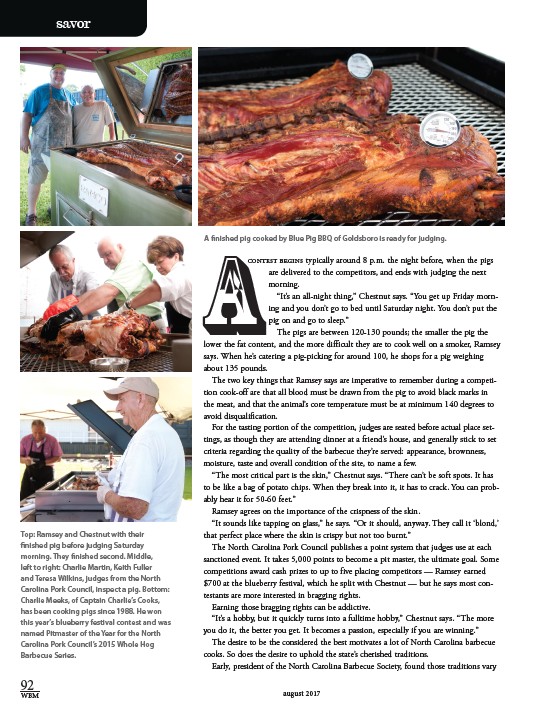
A finished pig cooked by Blue Pig BBQ of Goldsboro is ready for judging.
A
contest begins typically around 8 p.m. the night before, when the pigs
are delivered to the competitors, and ends with judging the next
morning.
“It’s an all-night thing,” Chestnut says. “You get up Friday morn-ing
and you don’t go to bed until Saturday night. You don’t put the
pig on and go to sleep.”
The pigs are between 120-130 pounds; the smaller the pig the
lower the fat content, and the more difficult they are to cook well on a smoker, Ramsey
says. When he’s catering a pig-picking for around 100, he shops for a pig weighing
about 135 pounds.
The two key things that Ramsey says are imperative to remember during a competi-tion
cook-off are that all blood must be drawn from the pig to avoid black marks in
the meat, and that the animal’s core temperature must be at minimum 140 degrees to
avoid disqualification.
For the tasting portion of the competition, judges are seated before actual place set-tings,
as though they are attending dinner at a friend’s house, and generally stick to set
criteria regarding the quality of the barbecue they’re served: appearance, brownness,
moisture, taste and overall condition of the site, to name a few.
“The most critical part is the skin,” Chestnut says. “There can’t be soft spots. It has
to be like a bag of potato chips. When they break into it, it has to crack. You can prob-ably
hear it for 50-60 feet.”
Ramsey agrees on the importance of the crispness of the skin.
“It sounds like tapping on glass,” he says. “Or it should, anyway. They call it ‘blond,’
that perfect place where the skin is crispy but not too burnt.”
The North Carolina Pork Council publishes a point system that judges use at each
sanctioned event. It takes 5,000 points to become a pit master, the ultimate goal. Some
competitions award cash prizes to up to five placing competitors — Ramsey earned
$700 at the blueberry festival, which he split with Chestnut — but he says most con-testants
are more interested in bragging rights.
Earning those bragging rights can be addictive.
“It’s a hobby, but it quickly turns into a fulltime hobby,” Chestnut says. “The more
you do it, the better you get. It becomes a passion, especially if you are winning.”
The desire to be the considered the best motivates a lot of North Carolina barbecue
cooks. So does the desire to uphold the state’s cherished traditions.
Early, president of the North Carolina Barbecue Society, found those traditions vary
savor
Top: Ramsey and Chestnut with their
finished pig before judging Saturday
morning. They finished second. Middle,
left to right: Charlie Martin, Keith Fuller
and Teresa Wilkins, judges from the North
Carolina Pork Council, inspect a pig. Bottom:
Charlie Meeks, of Captain Charlie’s Cooks,
has been cooking pigs since 1988. He won
this year’s blueberry festival contest and was
named Pitmaster of the Year for the North
Carolina Pork Council’s 2015 Whole Hog
Barbecue Series.
92
WBM august 2017